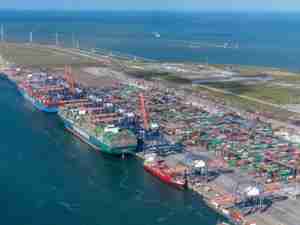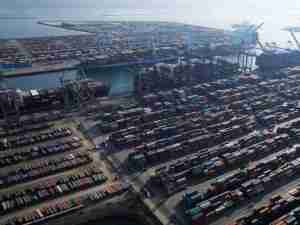About 200 million people in Uganda, Rwanda, Burundi, South Sudan and eastern Congo could be affected if Kenya goes through a fresh bout of fighting when it holds presidential and parliamentary elections on March 4.
The port of Mombasa serves its wide hinterland with imports that include oil, clinker which is used to make cement, steel, bitumen for road construction and second-hand cars, while the main exports include tea, coffee, and horticultural products.
Some 95 percent of all the cargo coming in through the port is trucked by road. Truck drivers at a weigh bridge in the small town of Athi River on the fringes of the capital Nairobi said there were already fears of violence.
"Everybody is scared about the elections, especially the foreign truck drivers. Last time some of us were attacked and goods were lost," said Charles Mburu, 36, who has driven trucks for the last eight years.
"Our employers are not just insuring the goods and trucks, but also the drivers. You have to be certain that they will compensate you in case of an attack."
Supporters of Prime Minister Raila Odinga, the opposition leader at the last vote, claimed he lost his bid for the Kenyan presidency after President Mwai Kibaki rigged the vote, setting off a bloodbath in which more than 1,200 people were killed and 300,000 displaced.
After the December 2007 election, machete-wielding youths blocked roads and looted trucks they had hijacked. They burnt tires to cut the road from the port and uprooted railway lines, strangling trade to Uganda, Rwanda and Burundi for weeks.
Odinga is back in the race for the presidency, and has a narrow lead over Deputy Prime Minister Uhuru Kenyatta, according to opinion polls, raising the specter of a close vote and a possible dispute over the result.
Kenya, Uganda and Tanzania all suffered inflationary pressures in 2008 due to the impact of the post-election crisis that damaged regional growth.
This pushed Uganda's headline inflation rate to over 10 percent in January 2008, while the country's revenue body reported daily revenue losses of up to $600,000.
Burundi's top hard currency earners coffee and tea were also hit hard - the tiny landlocked country transports over 80 percent of its produce through Kenya.
"Our tea stocks in Bujumbura expired for consumption because we could not export or send it to Mombasa," said Jacques Bigirimana, commercial director at state-run tea board.
Plan B
Banks and importers have been taking defensive positions by buying dollars in Kenya and Uganda, traders said.
The Uganda shilling hit a 14-month low against the dollar on Jan. 4 due to aid cuts by at least five western countries, including Uganda's biggest bilateral donor Britain, after officials in the prime minister's office were accused of embezzlement, and jitters over election violence in Kenya.
The Kenyan shilling has also taken a knock from the cautious importers stockpiling dollars, and is down 1.7 percent so far this year, despite the central bank selling dollars to shore up the local currency.
"If chaos breaks out in Kenya again, both the currencies will come under serious pressure due to investor flight," said Ignatius Chicha, head of markets at Citibank in Nairobi.
To mitigate against disruption of the supply of goods, the company operating Kenya's railway system has bolted down the railway track to prevent any chance that it may be damaged.
Opposition supporters in Nairobi's Kibera slums, one of Africa's largest urban settlements, manually uprooted miles of railway tracks in protest at what they said was a stolen vote, preventing the cargo from reaching Uganda.
"There is a learning curve from what happen in 2008," said Karim Sadek, the managing director of Egypt's Citadel Capital, owner of a Kenyan company that manages its railway line










